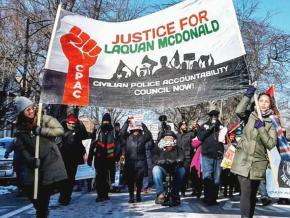Laquan deserved better than this
The Chicago cop found guilty Laquan McDonald’s murder received a sentence of under seven years. reports on the response to this miscarriage of justice.
PROTESTERS GATHERED on January 21 to respond to the news that a judge had sentenced 17-year-old Laquan McDonald’s killer Jason Van Dyke — the first Chicago police officer in 50 years to be convicted of murder while on duty — to just 81 months in jail.
In October, a court found Van Dyke guilty of second-degree murder and 16 counts of aggravated assault — a verdict that would have never happened without the hard-fought campaign led by local activists, clergy, teachers, parents and families, some of whom lost their own children at the hands of police.
Over the course of four years following McDonald’s murder in 2014, opponents of police terror marched, lobbied, blocked streets and highways, shut down businesses, and rallied workers across the city.
These protests eventually pressured city officials to release a long-suppressed video showing Van Dyke firing repeatedly at the teenager, who was walking away from officers when he was shot. The corruption of the Chicago Police Department (CPD) and City Council were exposed, provoking a much-needed conversation about the lack of mental health services in Chicago.

There would have been no guilty verdict without the work of activists. And as one speaker noted at the January 21 protest, “They’ll give a reform with a teaspoon, then take it away with a shovel.”
ON JANUARY 17, three officers who helped provide cover for Van Dyke by suppressing the video and falsifying reports were found not guilty of any crime. The next day, a judge sentenced Van Dyke to less than seven years in jail for the second-degree murder charge, choosing not to sentence him on the 16 counts of aggravated battery charges — one for every shot fired — which carried more serious time.
This means Van Dyke could serve less than three years for murdering Laquan.
Prior to Van Dyke’s fatal encounter with Laquan, the officer had racked up 22 complaints for his racist, brutal treatment of mostly Black Chicagoans. It’s important to say, with its history of corrupt retributive practices and veiled threats, filing complaints against any CPD officer is no small task.
During his sentencing hearing, witness after witness testified to being brutalized by Van Dyke and enduring all manner of dehumanizing racist vulgarity. One witness, Eddie Nance, recalled Van Dyke berating him, slamming him face first on his cousin’s car and wrenching his arm behind his back for a simple traffic stop — an injury that he has yet to recover from.
Another witness recalled being choked in the back of a squad car for not spitting out a cough drop after Van Dyke stopped him for failing to use a turn signal.
This was a far cry from the so-called “mild-mannered,” “hard-working,” “humble” and honest one-time offender described by family members, fellow officers and members of Fraternal Order of Police.
If this contradiction confuses you, you’re probably not alone. And that’s because Jason Van Dyke wasn’t the only person on trial. The truth is the very institution of policing (in the form of the CPD) was on trial, and the FOP and judicial system (the protectors of police) knew it.
This was clear to everyone, including State’s Attorney Kim Foxx, who was, after all, elected into office on a promise to hold police accountable for their historically racist treatment of Black people.
Regardless of all this, the sentencing made it clear that all this could have been avoided. Laquan could have been alive, getting the care and love he needed and deserved.
But the same corrupt mayoral office — and the representative of the 1 Percent who sat in that office for the last eight years — appointed an Independent Police Review Authority, which was then replaced by a Civilian Office of Police Accountability, to do what undemocratic bodies do: keep activists, families, concerned and angered communities in a holding pattern and denied justice and accountability.
THE JANUARY 21 protest at 51st and Martin Luther King Drive was organized to give space for community members, particularly Black Chicagoans, to express outrage that this killer cop would receive such short time, despite all the evidence against him. Organizations represented at the protest included Black Youth Project 100, Black Lives Matter Chicago, Chicago Alliance Against Racism and Political Repression and the International Socialist Organization
Even 14-degree temperatures didn’t keep South and West Siders away. Some 160 people came out to speak out against the light sentence for the killer cop, how this is linked to so many other attacks on Black Chicagoans, and the importance of protest.
At a press conference, activists with the Black Lives Matter movement said that gentrification, the rise in rent and removal of resources from Black communities has led to conflict and disparities. The activists pointed to the city’s response: Spending $95 million for a police academy — that is, putting more money in the same institution that enabled Laquan McDonald’s killer.
The march ended in the Woodlawn neighborhood with activists and even some aldermanic candidates highlighting the danger that the multimillion-dollar Obama Presidential Center, whose proposed location is Jackson Park, poses in displacing longtime Black residents from their communities.
Speakers pointed out the need for funding for the things that would make a real impact on people’s lives, such as a dramatic increase in health services across the South and West Sides of Chicago.
An activist ended the event by saying, “Black people, it is our duty to avenge the things that have happened to our ancestors. Latinx people, it is our duty to avenge the things that are has happened to our ancestors. Indigenous people, it is our duty to avenge the things that happen to our ancestors.”


